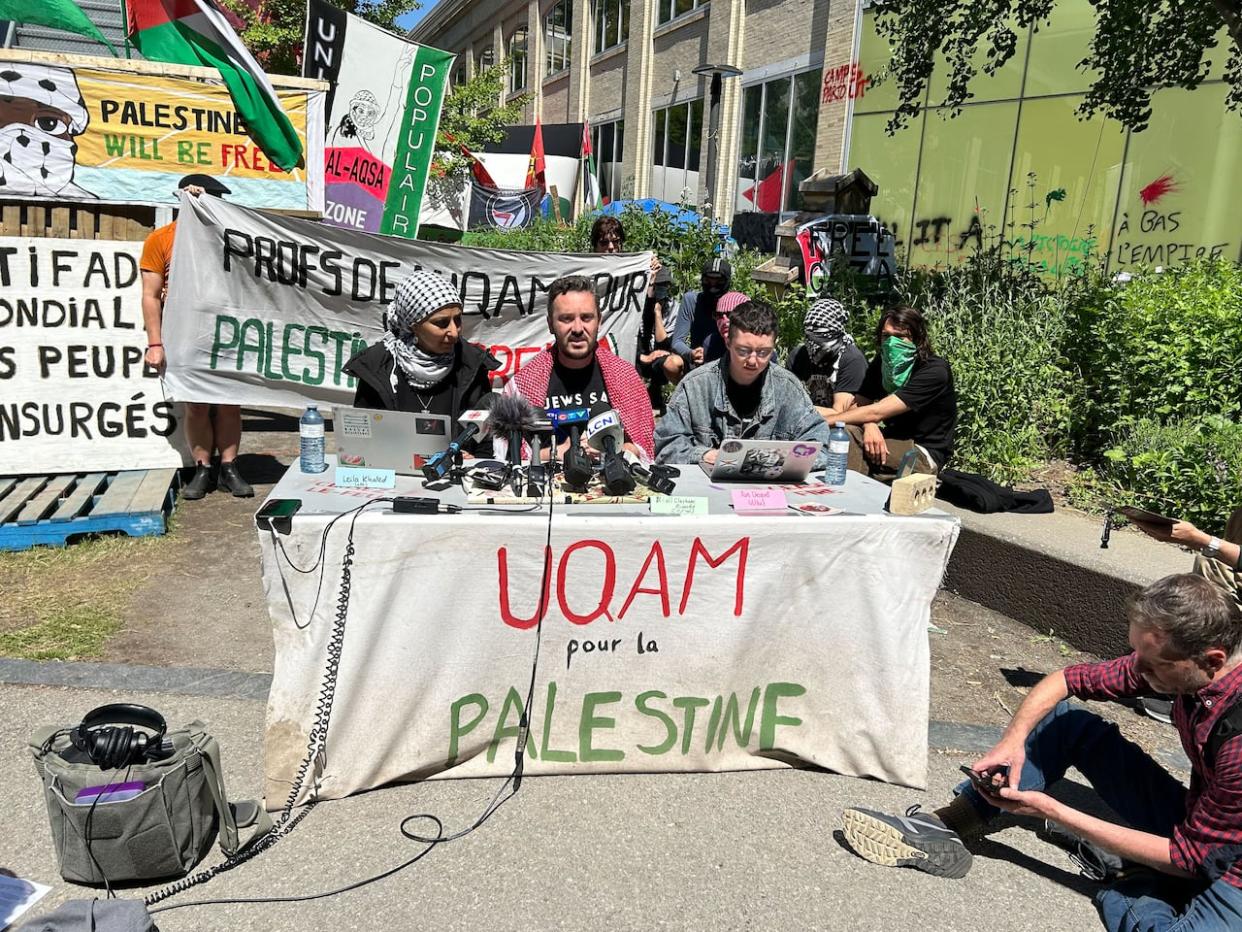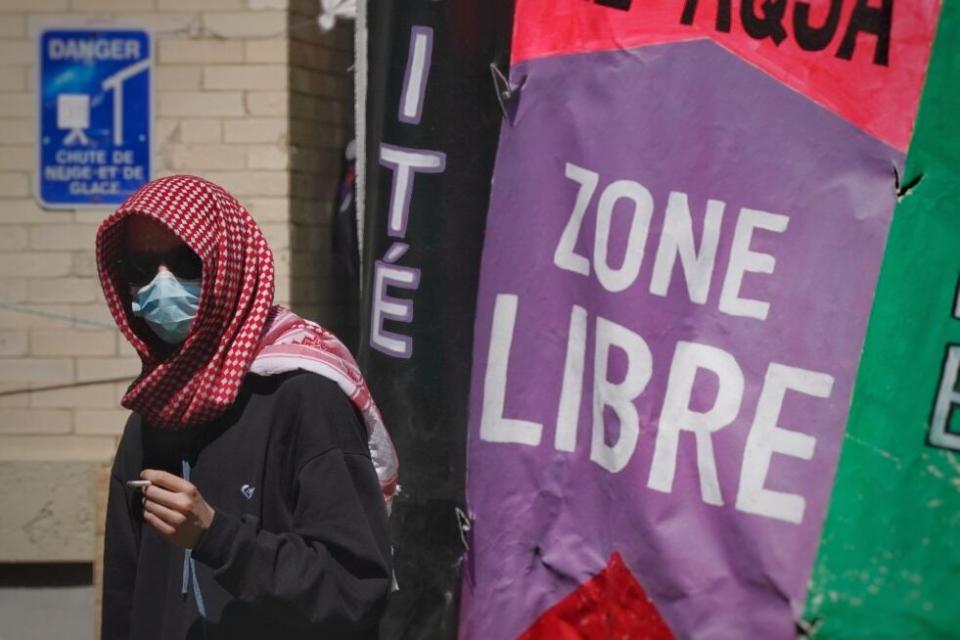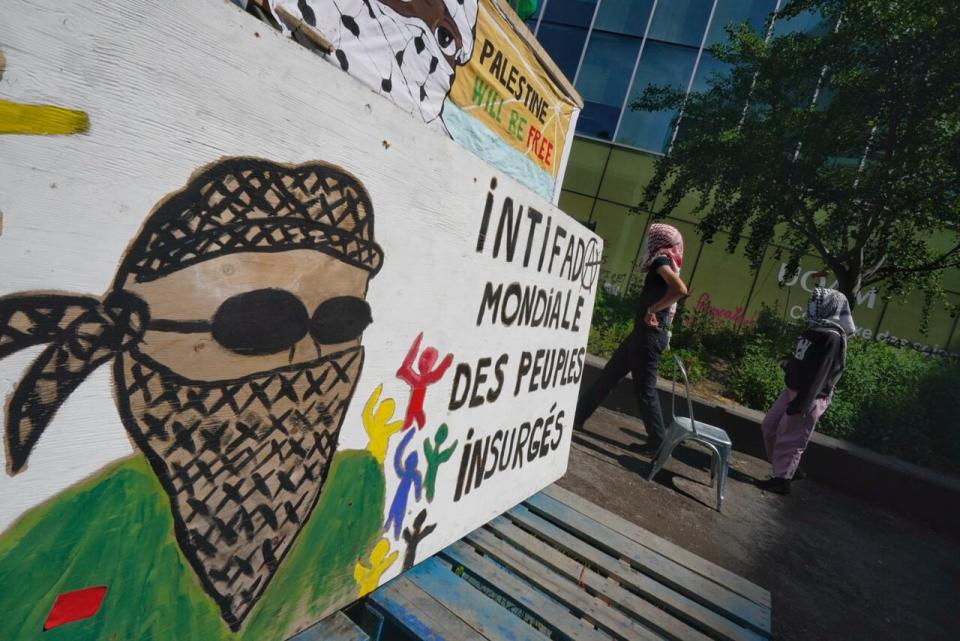Encampment at UQAM set to end as university agrees to protesters' demands

The pro-Palestinian encampment at the Université du Quebec à Montréal (UQAM) is coming down after the university's board of directors unanimously approved a resolution agreeing to most of the demands of the protesters who've been set up there since May 12.
"Through our occupation and our courage, we have proven that it is possible to establish a balance of power and obtain significant gains," a spokesperson for the protesters said in a statement.
"We are sending a clear message to the administrations of other universities. If you want to see an end to the encampments, you must take courageous actions," they said.
The protesters say the dismantling will happen progressively over the next few days, but most of the camp will remain in place until an academic council meeting at UQAM set for June 4, where the agreement will be voted on and finalized.
They say if all goes well at that meeting, the encampment will be fully dismantled by June 6.

UQAM reached a deal with those at the pro-Palestinian encampment on its campus, who say they will leave by June 6. (Ivanoh Demers/Radio-Canada)
The university released a copy of the adopted resolution Thursday morning. No one from UQAM's administration was immediately available to comment.
Among the several demands the university has agreed to:
Asking the UQAM Foundation to ensure it has no direct investment in weapons companies.
Calling for an immediate ceasefire in Gaza.
Committing to facilitating the reception of Palestinian academics and students and providing a budget for this purpose.
Though UQAM did not explicitly commit to an academic boycott of Israel, it "recognizes the violation of the Palestinian people's right to self-determination." It also recognizes the decisions of the International Court of Justice, which refer to plausible risks of genocide committed by Israel against the Palestinians in Gaza.

UQAM heeded to protesters demands that the university ensure it has no direct investment in weapons companies, calls for a ceasefire in Gaza and commit to facilitating the reception of Palestinian academics and students. (Ivanoh Demers/Radio-Canada)
The protesters say by noting violations of international law by Israel and by demanding that there be no academic agreement that conflicts with international law, the resolution "implicitly" boycotts Israeli universities.
"There aren't universities in Israel that aren't in some shape or form violating international law and aiding and abetting the Israeli war machine," Niall Clapham Ricardo, a spokesperson for the encampment and for Independent Jewish Voices, told journalists at a news conference Thursday.
Spokespeople for the encampment called UQAM's resolution a "highly symbolic step forward," and said their activism will not end there. They will continue to support encampments at other Quebec universities and push for Palestinian liberation at a provincial level, they said.
A protest against Quebec's Tel Aviv office is scheduled for June 6.
Pascale Déry, Quebec's higher education minister, told journalists Thursday that all encampments on campuses should be dismantled.
"I don't think it's the appropriate place to protest. I think there's another way to be able express ourselves," she said, adding she will follow developments closely.
McGill not budging
Meanwhile, negotiations between McGill University and those camping out on its campus haven't been moving forward.
McGill president Deep Saini has insisted that divestment from companies with ties to Israel — the protesters' main demand — was off the table. However, the university is willing to "examine divestment from companies whose revenues largely come from weapons." McGill has also offered to increase its support to displaced Palestinian scholars and institutions.
Zev Saltiel, a McGill student and member of Independent Jewish Voices, said he is "intrigued" by the latter proposition.
"Considering the tragic reality that all post-secondary educational institutions in Gaza have been decimated, how does McGill intend to establish these links?" he said.
"As a Jewish person, I implore McGill to speak truth to power, open their eyes and move."
Protesters have repeatedly said they won't move until McGill commits to full divestment and an academic boycott of Israel.
On Wednesday, Saini raised concerns of rising tensions on campus and once again called on police to step in — as they previously did with some of the protesters at UQAM. Montreal police Chief Fady Dagher told CBC Montreal's DaybreakThursday he did not want to escalate the situation.
Two provisional injunction requests were filed to have student activists removed from the McGill campus, both of which were rejected by Quebec Superior Court justices. The university is set to return to court again this summer to argue for the encampment to be dismantled.
In a statement posted on Instagram, Solidarity for Palestinian Human Rights McGill said the university hasn't been negotiating in good faith, has "slandered and targeted Palestinian students and groups" and "called for the arrest of their own students."
Protesters from the encampment at UQAM hope McGill will listen to the message they're sending.
"Police interventions or going to the courts are not the way to go. The way to go is to negotiate with students and cut ties to Israel," Clapham Ricardo said.


